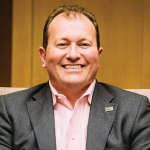Just weeks into his new role as Linklaters global head of banking, Tony Bugg told the firm’s 200 banking lawyers in London that a reorganisation will take place, with four group leaders introduced with greater power to set individual and group targets.
Bugg, who assumed the role after incumbent Gideon Moore was appointed managing partner of the firm, is reorganising the group as it pivots towards fast-growing shadow banking clients, starting with the London practice.
He cites the shake-up as an effort to put Linklaters’ finance practice back in the expansive mode it sustained through the 1990s and early 2000s. Linklaters’ banking practice makes up almost 20% of the firm’s income, but with traditional lenders losing market share over the past decade, Bugg wants to reposition the practice to attract a different breed of client. ‘We’re in good shape but our markets have changed,’ he said. ‘The fastest-growing area in the banking group is alternative lending.’
Bugg is dispensing with the banking team’s existing floor leader-management system to hand responsibility to four specialist team heads to ‘bring in more accountability’.
The firm’s London banking practice – a group that spans leveraged finance, restructuring, insolvency, high yield, asset finance and real estate finance – is currently spread across four floors of the City office and largely managed by floor-leaders insolvency partner Rebecca Jarvis, leveraged finance partner Adam Freeman, mainstream banking partner Philip Spittal and financial structuring partner Tom Wells.
This often led to a lack of accountability as partners could be set targets and appraised by someone outside of their specialism. It also made it difficult to create specific agendas for each team.
Instead, Bugg will appoint four practice heads for leveraged finance (including high yield), restructuring and insolvency, global loans (including asset finance, real estate finance and emerging markets) and financial structuring.
Leveraged finance will be led by Freeman, global loans by Spittal and financial structuring by Wells. The global head for restructuring and insolvency, the position Bugg held prior to running the banking group, is still going through a formal consultation.
While the group has made strong gains in the shadow banking space, transforming The Blackstone Group’s credit business GSO into a major client, London partner Yen Sum has been selected to lead a push for greater market penetration. A partner since 2010, Sum had previously worked in Barclays Capital’s leveraged finance unit and has since emerged as a rising star of the group.
Bugg said: ‘It requires a change of thinking. We’ve got some really great lawyers in the group who can lead by example and help people grow. So I want to encourage more partners to find ways of drawing other people into some of our key client relationships and give them the opportunities they need to develop themselves.’
He added: ‘We don’t have to reinvent the practice, but there are several things we need to better. We need to improve our understanding of these institutions, their people and what they want. We also need to better communicate what our experience looks like and how we can use that to help the client. Finally, we want to encourage partners to be more ambitious and entrepreneurial so the realignment of the practice will help us provide clients with an enhanced offering.’
Despite the fact that much of the group’s successful restructuring and leveraged finance arms were built around lateral hires in the late 1990s and early 2000s, Bugg said there is no need for lateral hires in the UK.
However, he does plan to review the firm’s property finance team, given real estate’s increasing popularity as an asset class among alternative finance providers. The team was trimmed during a restructuring by former managing partner Tony Angel in the 2000s and currently has three partners in London.
tom.moore@legalease.co.uk












